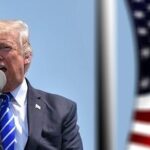Trump’s Health Defense Amid Age-Related Criticism: A Political Strategy for 2024
Former President Donald Trump has recently expressed strong disapproval of a New York Times article that questions his age and mental fitness. In response, he has vigorously defended his health, highlighting the results of what he describes as a “perfect physical exam” and a thorough cognitive assessment. As he gears up for the 2024 presidential election, Trump positions himself as both mentally sharp and physically capable. The article’s implications regarding age in leadership have sparked significant debate among supporters and critics alike, amplifying discussions about Trump’s qualifications as he prepares to run for office again.
Trump Defends His Fitness Amid Age Debate
In light of the New York Times’ scrutiny over his age as a candidate, Donald Trump has passionately asserted his mental and physical well-being. He pointed to his performance on a detailed cognitive evaluation alongside positive results from recent health check-ups, arguing that these findings contradict narratives propagated by opponents. This assertive stance not only aims to energize his base but also reframes concerns about aging politicians into an opportunity to challenge political rivals.
The discourse surrounding age in politics reveals critical insights into voter attitudes. Many of Trump’s supporters interpret his claims about fitness as an effective counter-narrative against common stereotypes associated with older candidates. Recent polling data indicates that perceptions of strength and decisiveness are pivotal factors influencing voter preferences across various demographics—qualities that Trump seeks to embody in this electoral cycle. By confronting ageism head-on, he reinforces both his candidacy and commitment to issues important to voters, potentially reshaping the political landscape leading up to 2024.
Public Perception Influenced by Cognitive Assessments
The recent controversy surrounding cognitive assessments highlighted in the New York Times underscores how public perception is intricately linked with leaders’ mental capabilities. As figures like Trump advocate for their cognitive strengths, it raises an essential question: how do these evaluations genuinely affect public opinion? While many voters may prioritize indicators of physical health over cognitive metrics, societal biases regarding aging can distort perceptions significantly across different groups.
Factors such as media representation, historical context, and individual biases play vital roles in shaping public sentiment towards candidates based on their age:
- Stereotypes About Aging: Preconceived notions can overshadow evidence demonstrating competency.
- Cultural Narratives: The nature of media coverage can influence how leaders’ cognitive abilities are perceived.
- Lived Experiences: Personal interactions with older individuals may shape voters’ views on mental acuity.
The table below illustrates potential voter reactions following announcements regarding leaders’ cognitive evaluations:
| Acknowledging Supporters | Citing experience and stability as key advantages. |
| Cautious Optimism | Acknowledging concerns related to age while remaining open-minded based on data provided. |
| Skeptical Opposition | Citing advanced years as grounds for questioning eligibility or capability. |
Navigating Age and Health Issues in Political Dialogue
Navigating discussions around age and health is increasingly crucial for candidates today. To effectively manage these topics, they must adopt proactive communication strategies emphasizing transparency while maintaining positivity about their capabilities. Candidates should showcase their strong physical condition alongside mental sharpness through public appearances or detailed health reports—actions which can enhance credibility amidst concerns tied to aging politicians.
For example, sharing outcomes from rigorous medical examinations could help alleviate doubts related to vitality while reinforcing confidence among constituents who value resilience born from experience.
Additionally, fostering conversations around the importance of diverse leadership—including representatives from all generations—can reshape narratives surrounding aging politicians.
Utilizing social media campaigns focused on celebrating seasoned leaders’ strengths allows candidates like Trump not only to reframe discussions but also present themselves positively within broader contexts where experience is viewed favorably rather than negatively.
The goal remains clear: create a narrative intertwining experience with robust health attributes—a compelling platform appealing across demographic lines during elections ahead!
Conclusion: The Intersection of Age & Leadership Dynamics Ahead of Elections
The fervent response from former President Donald Trump concerning recent critiques highlights ongoing debates at the intersection between leadership effectiveness tied closely with advancing years within American politics today! His emphasis upon achieving “perfect” scores during both medical exams & comprehensive assessments serves dual purposes; defending personal stamina whilst simultaneously critiquing scrutiny faced by aged political figures overall! As we approach upcoming elections slated throughout next year (2024), addressing matters relating directly back towards one’s own longevity will undoubtedly play pivotal roles shaping opinions amongst voters nationwide! With evolving narratives unfolding continuously around this topic area—it remains clear implications exist not just solely impacting him—but extending outwardly toward potential challengers too!
`









